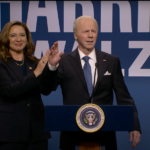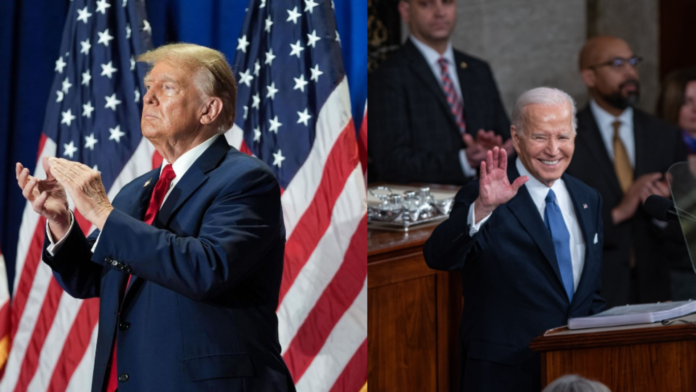The promise of change has been a powerful force in presidential campaigns for decades, resonating with the fundamental desires of American voters. It was the centerpiece of campaigns for candidates such as John F. Kennedy, Ronald Reagan, Barack Obama, and Donald J. Trump.
When Bill Clinton seized the White House in 1992, his campaign slogan, “Change vs. more of the same,” was emblazoned on a banner hung over a war room wall with one hand. Yet this year, Americans, hungry for a new direction in almost every way, are grappling with the choice between continuity or upheaval.
In the riveting showdown, President Biden faces off against former President Donald J. Trump in a rare election without a major party candidate, which could be presented in a new light with new faces and a new era. Not everyone is ready to embrace all the excitement and anticipation that comes with unknown possibilities. Instead, Americans are being given another chance to witness a race between a president and a former president, both well over 90% of Americans – Mr. Biden at 81 and Mr. Trump at 77 – and both seen mostly unfavorably by a majority.
Whichever campaign manages the competition better, meaning in many respects, being nimble with the changing winds, could tip the scales heavily in their favor in the next eight months.
Describing the main dynamics in American politics, senior strategist for Mr. Clinton’s presidential campaigns, Paul Begala, said, “There are only two options: stay on the path or it’s time for change.” “We want change,” Mr. Begala said about the nation. “We’re revolutionaries. We’re made for change.”
This dynamism is particularly challenging for Mr. Biden, even though former presidents are among the most prominent figures in American political history. While incumbent presidents are almost always forced to run on their records, Mr. Biden has accepted a discipline by pledging to “finish the job” in his second term. But he has also attempted to shift focus. In his State of the Union address on Thursday, Mr. Biden spoke as much about Mr. Trump’s agenda as his own.
Promising a new chapter has been a recurring and often decisive theme in American campaigns since 1960 when young Mr. Kennedy secured his place in history by winning the coveted seat in the White House. Jimmy Carter won the election in the aftermath of Watergate by presenting himself as “a change agent” in 1976. Four years later, Mr. Reagan removed Mr. Carter amid a stable economy, promising to “Let’s make America great again.”
In the captivating saga of American politics, Mr. Obama’s groundbreaking campaign was a symphony of hope, emblazoned on everything from T-shirts and posters to iconic speeches, all echoing the powerful mantra of “We can believe in change.” Conversely, Mr. Trump embarked on his political journey, ingeniously adopting Mr. Reagan’s timeless slogan, seamlessly transforming it into his emblem of leadership and vision.
However, this election is a discord in many respects. Rarely has there been a presidential election where there has been such a stark divide – both candidates from the country and the major parties wanting to lead it.
It has been 20 years since the attack on Iraq, as most Americans thought the country was heading in the wrong direction rather than the right one. The latest ABC News survey found that 73 percent of voters believed the country was on the wrong track – with dissatisfaction with the direction of the country hovering at nearly 70 percent for the past three years. Never before in the history of polling have so many voters remained unhappy for such a long time.
In a recent survey by The New York Times/Siena College, more than four times as many voters said they were angry, fearful, disillusioned, resigned, apprehensive, or disappointed about this election, while they said they were happy, excited, or hopeful about it.
So many Americans want the country to move in a different direction that it has raised concerns among many Democrats as they watch President Biden in the early days of his re-election campaign.
Douglas Sosnik, a former senior adviser to President Clinton, said, “In this atmosphere of discontent, which is two decades old, change is a powerful force.” “If the choice is whether you prefer to stay the course or make a change, I will always bring change to the world we live in.”
Pete Giangreco, a campaign adviser to Mr. Obama, agreed, saying that since the coronavirus pandemic, the American mood has become even more pessimistic. He said it is essential to appeal to restless Americans as Mr. Biden and Mr. Trump plan future campaigns.
“When less than 30 percent of people believe the country is heading in the right direction, it’s better to be an agent of change,” he said. “It’s better to persuasively argue who will bring about better change; otherwise, you won’t get more than 50 percent anywhere.”
Presenting himself as a candidate for change, Mr. Trump will face his own challenges. He has had less than four years in office, and since then, he has dominated American politics. This could pose a challenge for Trump supporters who are trying to present him as a candidate for change.
South Carolina Republican Senator Tim Scott said on Fox News this week, “We have to go back to that future – from 2017 to 2020.” “We want those four years back.”
Yet Mr. Trump has presented himself as an outsider in national politics throughout his entire presidency; his 2016 race for the White House, alongside Mr. Obama’s campaign, is one of the best examples of modern political change. His advisers and allies have made it clear that he will once again claim to be an agent of change.
Republican strategist Kellyanne Conway, who was Mr. Trump’s campaign manager in 2016, said, “He is not an incumbent.” “He is a rebel.”
The campaign of Mr. Biden is emphasizing a claim, giving a warning that it’s not just a change of presidency, but the face of disorderliness.
Leader of the Democratic majority, Senator Chuck Schumer of New York, said in an interview, “I think Trump is a candidate for change.” “But most people think it’s a change for the worse.”
Ms. Conway pointed out a fascinating shift in American sentiment towards Mr. Trump. She emphasized that as Americans grow more acquainted with him, they’re shedding their initial apprehensions and embracing the changes that his potential second term might bring. It’s a testament to the evolving relationship between the electorate and the President, marking a pivotal moment in political discourse.
“It’s a shift amid uncertainty,” she remarked. “Americans are drawn to the allure of change, the promise of choice, and the excitement of revolution. Yet, paradoxically, they find comfort in routine, like their thrice-weekly trips to Chick-fil-A in their trusty minivans.”
In the latest Times/Siena survey, 47 percent of respondents said they completely disagreed that Mr. Biden is handling his job well. In the latest NBC survey, the president’s approval rating is 37 percent, the lowest for any sitting president in four decades. But the same survey suggested that voters will be as challenging to their incumbent as to the current one. This is potentially good news for Biden’s camp, indicating that he intends to win the election based on public opinion against Mr. Trump.
Mr. Biden has an example to follow for what he hopes to achieve. In 2012, when Mr. Obama was seeking a second term, his campaign reviewed voter data, which showed dissatisfaction among voters with the economy, and responded with designed economic policy proposals to alleviate concerns among the middle class. The new message helped divert the race toward his opponent Mitt Romney, distancing him from the concerns of average, affluent, and working-class Americans.
Mr. Giancarlo remarked, “Had we framed our campaign as a direct verdict on the presidency, our chances of success would have been slim to none.” His words shed light on the strategic considerations and nuanced approach required in navigating the political landscape. This insight underscores the importance of tactful messaging and avoiding potential pitfalls that could jeopardize electoral outcomes.
- Chicago rapper Lil Durk implicated in alleged murder-for-hire scheme, court documents reveal

- Drake Hogestyn, ‘Days of our Lives’ veteran, dead from cancer a day before his birthday

- SNL kicks off with a star-studded cold open featuring Maya Rudolph as Kamala Harris and a return of Trump

- A mother of two, currently pregnant, feels utterly confined within her home in North Carolina.

- Caleb Williams Shines with Key Highlights in Stellar Preseason Debut for Bears





Thank you for your sharing. I am worried that I lack creative ideas. It is your article that makes me full of hope. Thank you. But, I have a question, can you help me?
Can you be more specific about the content of your article? After reading it, I still have some doubts. Hope you can help me.
Thanks for sharing. I read many of your blog posts, cool, your blog is very good.
Your point of view caught my eye and was very interesting. Thanks. I have a question for you.
Thanks for sharing. I read many of your blog posts, cool, your blog is very good.
Thank you for your sharing. I am worried that I lack creative ideas. It is your article that makes me full of hope. Thank you. But, I have a question, can you help me?